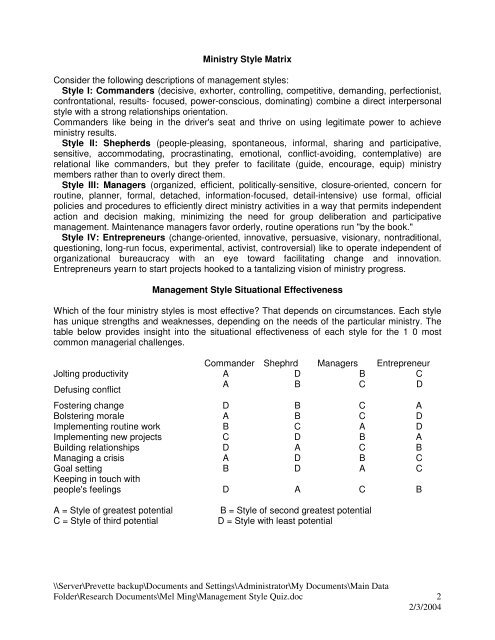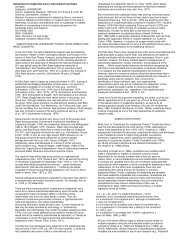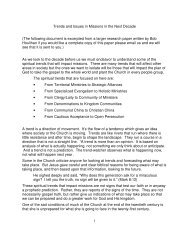Management Style Quiz - Prevette Research
Management Style Quiz - Prevette Research
Management Style Quiz - Prevette Research
Create successful ePaper yourself
Turn your PDF publications into a flip-book with our unique Google optimized e-Paper software.
Ministry <strong>Style</strong> Matrix<br />
Consider the following descriptions of management styles:<br />
<strong>Style</strong> I: Commanders (decisive, exhorter, controlling, competitive, demanding, perfectionist,<br />
confrontational, results- focused, power-conscious, dominating) combine a direct interpersonal<br />
style with a strong relationships orientation.<br />
Commanders like being in the driver's seat and thrive on using legitimate power to achieve<br />
ministry results.<br />
<strong>Style</strong> II: Shepherds (people-pleasing, spontaneous, informal, sharing and participative,<br />
sensitive, accommodating, procrastinating, emotional, conflict-avoiding, contemplative) are<br />
relational like commanders, but they prefer to facilitate (guide, encourage, equip) ministry<br />
members rather than to overly direct them.<br />
<strong>Style</strong> III: Managers (organized, efficient, politically-sensitive, closure-oriented, concern for<br />
routine, planner, formal, detached, information-focused, detail-intensive) use formal, official<br />
policies and procedures to efficiently direct ministry activities in a way that permits independent<br />
action and decision making, minimizing the need for group deliberation and participative<br />
management. Maintenance managers favor orderly, routine operations run "by the book."<br />
<strong>Style</strong> IV: Entrepreneurs (change-oriented, innovative, persuasive, visionary, nontraditional,<br />
questioning, long-run focus, experimental, activist, controversial) like to operate independent of<br />
organizational bureaucracy with an eye toward facilitating change and innovation.<br />
Entrepreneurs yearn to start projects hooked to a tantalizing vision of ministry progress.<br />
<strong>Management</strong> <strong>Style</strong> Situational Effectiveness<br />
Which of the four ministry styles is most effective? That depends on circumstances. Each style<br />
has unique strengths and weaknesses, depending on the needs of the particular ministry. The<br />
table below provides insight into the situational effectiveness of each style for the 1 0 most<br />
common managerial challenges.<br />
Commander Shephrd Managers Entrepreneur<br />
Jolting productivity A D B C<br />
Defusing conflict<br />
A B C D<br />
Fostering change D B C A<br />
Bolstering morale A B C D<br />
Implementing routine work B C A D<br />
Implementing new projects C D B A<br />
Building relationships D A C B<br />
Managing a crisis A D B C<br />
Goal setting B D A C<br />
Keeping in touch with<br />
people's feelings D A C B<br />
A = <strong>Style</strong> of greatest potential<br />
C = <strong>Style</strong> of third potential<br />
B = <strong>Style</strong> of second greatest potential<br />
D = <strong>Style</strong> with least potential<br />
\\Server\<strong>Prevette</strong> backup\Documents and Settings\Administrator\My Documents\Main Data<br />
Folder\<strong>Research</strong> Documents\Mel Ming\<strong>Management</strong> <strong>Style</strong> <strong>Quiz</strong>.doc 2<br />
2/3/2004




